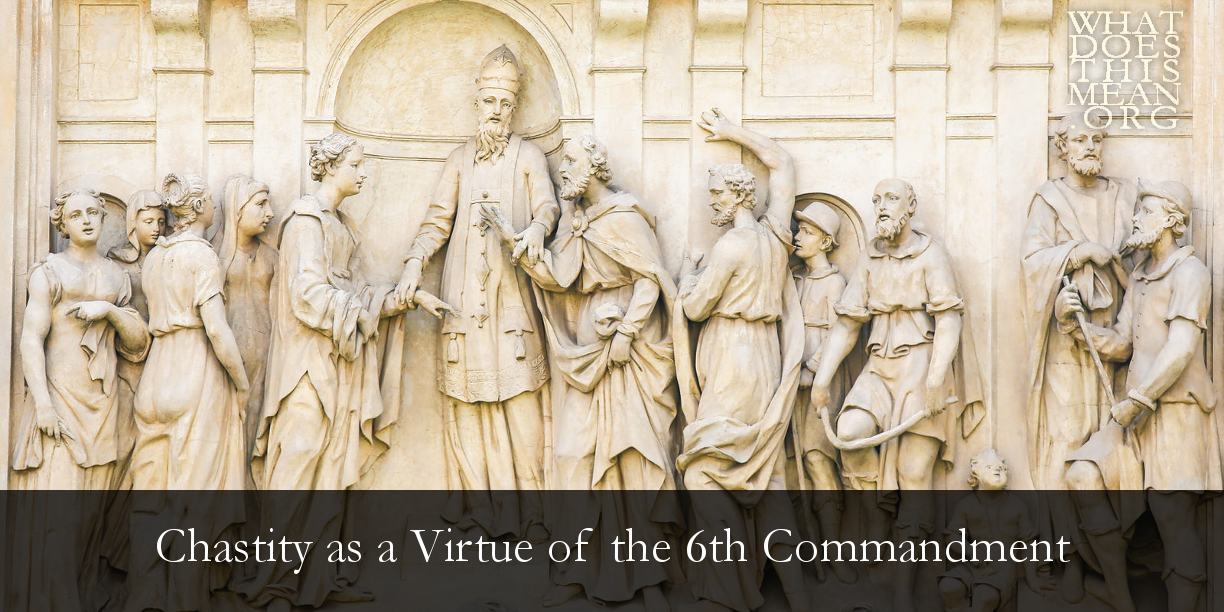When we consider the 6th commandment, it seems that often times we think only in terms of NOT doing something. Perhaps the main thing that comes to mind is either abstinence or adultery, both of which are negatives. However, there is much more going on here, and the virtue of Chastity points us to the full richness of this commandment.
When we talk about chastity, we’re not just talking about not doing certain things, but we’re being encouraged to live positively in a certain way. Additionally, where a term like abstinence is something you can “grow out of” (a husband is not given to be abstinent with his wife for example), chastity applies to you at every age, in every vocation, whether you are single, married, widowed, etc.
So when the Lord encourages us to live a chaste life, we’re being encouraged to live under the 6th commandment in every aspect of our lives; speech, conduct, thinking, etc. It’s good then for us to take a brief look at these and consider how the Lord directs our lives according to this commandment.
(In the following I am indebted especially to Martin Chemnitz. For a fuller treatment you can consider his work in the Loci Theologici Vol. II, pp. 749-759 and the Examination of the Council of Trent, Part III, pp. 15-35)
Chaste actions: this is maybe the most obvious part of chastity, so it’s good to start here. Chaste actions simply means that we only give our bodies over to our spouse in any sort of sexual manner. This is because the estate of marriage is, at least in part, governed by this act, as the scriptures remind us, often repeating the refrain from the institution of marriage in Genesis “And the two will become one flesh.”
Chaste mannerisms: this is slightly different from the above. Here, we are to act in such a way that we guard our neighbor’s eyes from anything that might cause them to stumble, especially according to the 6th commandment. This aspect of chastity is very closely tied to the following aspect, chaste dress.
Chaste dress: once again, we are given to guard the eyes of our brothers and sisters, not only by the way we act, but also by the way we dress. We remember that clothing itself is a product of the fall and the covering of nakedness and shame. So we, likewise, dress ourselves appropriately in order to keep our neighbor from sinning with their eyes. While it is true that each person is responsible for where their eyes go, we can and should help our neighbor whenever possible to do so by dressing modestly, or rather, chastely.
Chaste eyes: the scriptures exhort us to watch where our eyes go. David reminds us in Psalm 101: “I will ponder the way that is blameless…I will not set before my eyes anything that is worthless.” And so we are to be diligent in what we set before our eyes, and strive to keep them chaste so that we do not end up like the ungodly that St. Peter describes as those who have “eyes full of adultery, insatiable for sin.”
Chaste lips: the Lord exhorts us constantly to guard our speech. In the 141st Psalm we pray that the Lord would “set a watch before my mouth and guard the door of my lips.” This is because “life and death are in the power of the tongue and those who love it will eat its fruit.” Regarding the 6th commandment we are exhorted to put away all “obscene talk from your mouth.” And while this is good for us, like much of chastity, the goal is to also guard our neighbor. Here, we are guarding our neighbor’s ears, so that they, too, would be kept chaste.
Chaste ears: related to chaste lips, we should guard what we listen to, making sure that all things accord with godliness and the virtue of chastity. We should not only keep profane speech from coming from our mouths, but when we encounter it from others we should avoid it, lest we become dull in conscience to these sins.
In all of this, we ought to take seriously the exhortation of St. Paul, and consider it an encouragement toward godly living in all aspects, but especially in chaste living:
“Finally, brothers, whatever is true, whatever is honorable, whatever is just, whatever is pure, whatever is lovely, whatever is commendable, if there is any excellence, if there is anything worthy of praise, think about these things. What you have learned and received and heard and seen in me—practice these things, and the God of peace will be with you.”



 RSS Feed
RSS Feed
